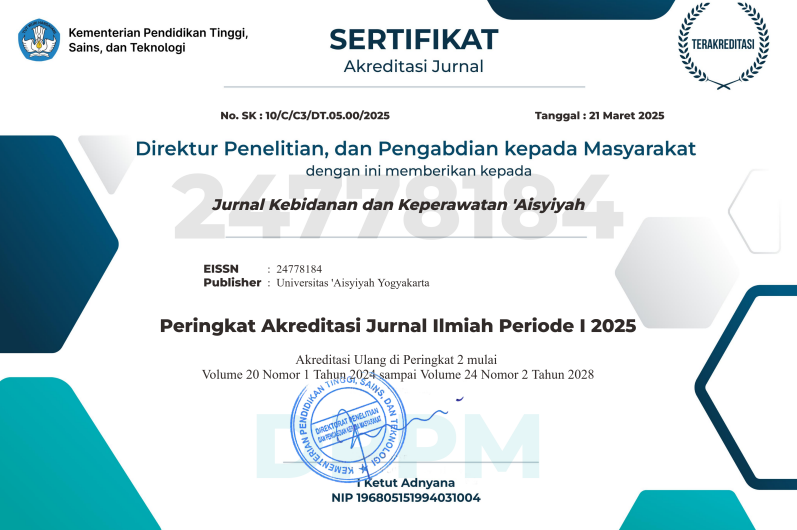Pengetahuan dan efikasi diri wanita usia subur terhadap skrining kanker serviks
DOI:
https://doi.org/10.31101/jkk.2335Abstract views 1150 times
Keywords:
cervical cancer, knowledge, self-efficacy, screeningAbstract
Downloads
References
Abdullah, S. M. (2019). Social Cognitive Theory : A Bandura Thought Review published in 1982-. 2012.Psikodemensia, 18 (1)
The American College of Obstetricians and Gynecologists (ACOG). (2021). Cervical Cancer Screening. Retrieved (https://www.acog.org/womens-health/faqs/cervical-cancer-screening)
Armini, N. K. A., Kurnia, I. D., & Hikmah, F. L. (2016). Faktor Personal , Self Efficacy Dan Upaya Pencegahan Kanker Serviks Pada Perempuan Usia Produktif ( Personality Factor , Self Efficacy and Prevention of Cervical Cancer among Childbearing Age Women ). Jurnal Ners Unair, 11, 294–299.
Bahmani, A., Baghianimoghadam, M. H., Enjezab, B., & Mazloomy, S. S. (2016). Factors Affecting Cervical Cancer Screening Behaviors Based on the Precaution Adoption Process Model : A Qualitative Study. 8(6), 211–218. https://doi.org/10.5539/gjhs.v8n6p211
Budiman, B., Hidayat Y.M., Harsono, A.B. (2019). Evaluasi Program Deteksi Dini Kanker Serviks dengan Metode See and Treat di Kabupaten Karawang. Indonesian Journal of Obstetrics & Gynecology Science. Vol 2 (1) 72-80.
Dahlan, M.S. (2016). Besar Sampel Dalam Penelitian Kedokteran dan Kesehatan. Jakarta : Epidemiologi Indonesia.
Fitriyah, L. A., Wijayadi, A. W., Manasikana, O. A., & Hayati, N. (2019). Menanamkan Efikasi Diri dan Kestabilan Emosi. In LPPM UNHASY Tebuireng Jombang (Issue 55). http://eprints.unhasy.ac.id/43/17/LINA-Buku ISBN Efikasi Diri.pdf
Ferlay, J., Soerjomataram, I., Dikshit, R., Eser, S., Mathers, C., Rebelo, M., Parkin, D. M., Forman, D., & Bray, F. (2015). Cancer incidence and mortality worldwide: Sources, methods and major patterns in GLOBOCAN 2012. International Journal of Cancer, 136(5), E359–E386. https://doi.org/10.1002/ijc.29210
Flores, B. E., & Acton, G. J. (2013). Older Hispanic Women, Health Literacy, and Cervical Cancer Screening. Clinical Nursing Research, 22(4), 402–415. https://doi.org/10.1177/1054773813489309
Ghalavandi, S., Heidarnia, A., & Zarei, F. (2021). Knowledge , attitude , practice , and self-efficacy of women regarding cervical cancer screening. Obstetrics & Gynecology Science, 64(2), 216–225.
Gupta, R., Gupta, S., Mehrotra, R., & Sodhani, P. (2017). Cervical cancer screening in resource-constrained countries: Current status and future directions. Asian Pacific Journal of Cancer Prevention, 18(6), 1461–1467. https://doi.org/10.22034/APJCP.2017.18.6.1461
Juwitasari, et al. (2021). Husband Support Mediates the Association between Self-Efficacy and Cervical Cancer Screening aming Women in the Rural Area of Indonesia. Journal of Oncology Nursing, 8(5)
Kemenkes RI. (2015). Program Nasional Gerakan Pencegahan dan Deteksi Dini Kanker Leher Rahim dan Kanker Payudara. In Kementerian Kesehatan RI (Issue April).
Kemkes RI. (2016, December 19). Pemeriksaan Dini Kanker di Lingkungan Kemenkes Dalam Rangka HUT DWP ke-17 dan Hari Ibu ke-88. Kemkes RI. https://www.kemkes.go.id/article/view/16122100002/pemeriksaan-dini-kanker-di-lingkungan-kemenkes-dalam-rangka-hut-dwp-ke-17-dan-hari-ibu-ke-88.html
Landy, R., Pesola, F., Castañón, A., & Sasieni, P. (2016). Impact of cervical screening on cervical cancer mortality: Estimation using stage-specific results from a nested case-control study. British Journal of Cancer, 115(9), 1140–1146. https://doi.org/10.1038/bjc.2016.290
Mo, H. S., Choi, K. B., & Kim, J. S. (2013). Effects of a Peer Cervical Cancer Prevention Education Program on Korean Female College Students’ Knowledge, Attitude, Self-efficacy, and Intention. Korean Journal of Adult Nursing, 25(6), 736–746. https://doi.org/DOI: 10.7475/kjan.2012.24.6.736
Mustafa, R. A., Santesso, N., Khatib, R., Mustafa, A. A., Wiercioch, W., Kehar, R., Gandhi, S., Chen, Y., Cheung, A., Hopkins, J., Ma, B., Lloyd, N., Wu, D., Broutet, N., & Schünemann, H. J. (2015). Systematic reviews and meta-analyses of the accuracy of HPV tests , visual inspection with acetic acid , cytology , and colposcopy. International Journal of Gynecology and Obstetrics. https://doi.org/10.1016/j.ijgo.2015.07.024
Osorio, A., López-Del Burgo, C., Carlos, S., Ruiz-Canela, M., Delgado, M., & De Irala, J. (2012). First sexual intercourse and subsequent regret in three developing countries. Journal of Adolescent Health, 50(3), 271–278. https://doi.org/10.1016/j.jadohealth.2011.07.012
Pirzadeh, A., & Mazaheri, M. A. (2012). The Effect of Education on Women’s Practice Based on the Health Belief Model About Pap Smear Test. International Journal of Preventive Medicine, 3(8), 585–590.
Ratanasiripong, N. T. (2012). A review of human papillomavirus (HPV) infection and HPV vaccine-related attitudes and sexual behaviors among college-aged women in the United States. Journal of American College Health, 60(6), 461–470. https://doi.org/10.1080/07448481.2012.684365
Shofiah, V., & Raudatussalamah. (2014). Self- Efficacy dan Self- Regulation Sebagai Unsur Penting dalam Pendidikan Karakter. Kutubkhanah: Jurnal Penelitian Sosial Keagamaan, 17(2), 214–229.
Sulistiowati, E., & Sirait, A. M. (2014). Pengetahuan Tentang Faktor Risiko, Perilaku Dan Deteksi Dini Kanker Serviks Dengan Inspeksi Visual Asam Asetat (Iva) Pada Wanita Di Kecamatan Bogor Tengah, Kota Bogor. Buletin Penelitian Kesehatan, 42(3), 193–202.
Tiraki, Z., & Yılmaz, M. (2018). Cervical Cancer Knowledge, Self-Efficacy, and Health Literacy Levels of Married Women. Journal of Cancer Education, 33(6), 1270–1278. https://doi.org/10.1007/s13187-017-1242-3
Yang, D. X., Soulos, P. R., Davis, B., Gross, C. P., & Yu, J. B. (2018). Impact of widespread cervical cancer screening: number of cancers prevented and changes in race-specific incidence. Am J Clin Oncol, 41(3), 289–294. https://doi.org/10.1111/mec.13536.Application
Downloads
Published
How to Cite
Issue
Section
License
With the receipt of the article by the Jurnal Kebidanan dan Keperawatan Aisyiyah Editorial Board and the decision to be published, then the copyright regarding the article will be diverted to Jurnal Kebidanan dan Keperawatan Aisyiyah. Universitas 'Aisyiyah Yogyakarta as the publisher of Jurnal Kebidanan dan Keperawatan Aisyiyah hold the copyright regarding all the published articles in this journal.
Jurnal Kebidanan dan Keperawatan Aisyiyah is licensed under a Creative Commons Attribution-ShareAlike 4.0 International License.
















